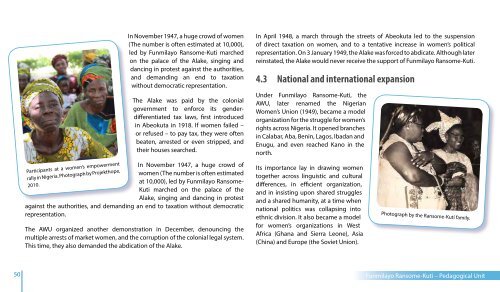FunmilayO Ransome-Kuti
1Ygy8Ef
1Ygy8Ef
You also want an ePaper? Increase the reach of your titles
YUMPU automatically turns print PDFs into web optimized ePapers that Google loves.
Participants at a women’s empowerment<br />
rally in Nigeria. Photograph by Projekthope,<br />
2010.<br />
In November 1947, a huge crowd of women<br />
(The number is often estimated at 10,000),<br />
led by Funmilayo <strong>Ransome</strong>-<strong>Kuti</strong> marched<br />
on the palace of the Alake, singing and<br />
dancing in protest against the authorities,<br />
and demanding an end to taxation<br />
without democratic representation.<br />
The Alake was paid by the colonial<br />
government to enforce its genderdifferentiated<br />
tax laws, first introduced<br />
in Abeokuta in 1918. If women failed –<br />
or refused – to pay tax, they were often<br />
beaten, arrested or even stripped, and<br />
their houses searched.<br />
In November 1947, a huge crowd of<br />
women (The number is often estimated<br />
at 10,000), led by Funmilayo <strong>Ransome</strong>-<br />
<strong>Kuti</strong> marched on the palace of the<br />
Alake, singing and dancing in protest<br />
against the authorities, and demanding an end to taxation without democratic<br />
representation.<br />
The AWU organized another demonstration in December, denouncing the<br />
multiple arrests of market women, and the corruption of the colonial legal system.<br />
This time, they also demanded the abdication of the Alake.<br />
In April 1948, a march through the streets of Abeokuta led to the suspension<br />
of direct taxation on women, and to a tentative increase in women’s political<br />
representation. On 3 January 1949, the Alake was forced to abdicate. Although later<br />
reinstated, the Alake would never receive the support of Funmilayo <strong>Ransome</strong>-<strong>Kuti</strong>.<br />
4.3 National and international expansion<br />
Under Funmilayo <strong>Ransome</strong>-<strong>Kuti</strong>, the<br />
AWU, later renamed the Nigerian<br />
Women’s Union (1949), became a model<br />
organization for the struggle for women’s<br />
rights across Nigeria. It opened branches<br />
in Calabar, Aba, Benin, Lagos, Ibadan and<br />
Enugu, and even reached Kano in the<br />
north.<br />
Its importance lay in drawing women<br />
together across linguistic and cultural<br />
differences, in efficient organization,<br />
and in insisting upon shared struggles<br />
and a shared humanity, at a time when<br />
national politics was collapsing into<br />
ethnic division. It also became a model<br />
for women’s organizations in West<br />
Africa (Ghana and Sierra Leone), Asia<br />
(China) and Europe (the Soviet Union).<br />
Photograph by the <strong>Ransome</strong>-<strong>Kuti</strong> family.<br />
50<br />
Funmilayo <strong>Ransome</strong>-<strong>Kuti</strong> – Pedagogical Unit


